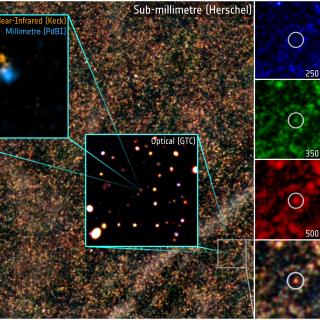Bibcode
DOI
Boselli, A.; Eales, S.; Cortese, L.; Bendo, G.; Chanial, P.; Buat, V.; Davies, J.; Auld, R.; Rigby, E.; Baes, M.; Barlow, M.; Bock, J.; Bradford, M.; Castro-Rodriguez, N.; Charlot, S.; Clements, D.; Cormier, D.; Dwek, E.; Elbaz, D.; Galametz, M.; Galliano, F.; Gear, W.; Glenn, J.; Gomez, H.; Griffin, M.; Hony, S.; Isaak, K.; Levenson, L.; Lu, N.; Madden, S.; O'Halloran, B.; Okamura, K.; Oliver, S.; Page, M.; Panuzzo, P.; Papageorgiou, A.; Parkin, T.; Perez-Fournon, I.; Pohlen, M.; Rangwala, N.; Roussel, H.; Rykala, A.; Sacchi, N.; Sauvage, M.; Schulz, B.; Schirm, M.; Smith, M. W. L.; Spinoglio, L.; Stevens, J.; Symeonidis, M.; Vaccari, M.; Vigroux, L.; Wilson, C.; Wozniak, H.; Wright, G.; Zeilinger, W.
Referencia bibliográfica
The Publications of the Astronomical Society of the Pacific, Volume 122, Issue 889, pp. 261-287.
Fecha de publicación:
3
2010
Número de citas
254
Número de citas referidas
234
Descripción
The Herschel Reference Survey is a Herschel guaranteed time key project
and will be a benchmark study of dust in the nearby universe. The survey
will complement a number of other Herschel key projects including large
cosmological surveys that trace dust in the distant universe. We will
use Herschel to produce images of a statistically-complete sample of 323
galaxies at 250, 350, and 500 μm. The sample is volume-limited,
containing sources with distances between 15 and 25 Mpc and flux limits
in the band to minimize the selection effects associated with dust and
with young high-mass stars and to introduce a selection in stellar mass.
The sample spans the whole range of morphological types (ellipticals to
late-type spirals) and environments (from the field to the center of the
Virgo Cluster) and as such will be useful for other purposes than our
own. We plan to use the survey to investigate (i) the dust content of
galaxies as a function of Hubble type, stellar mass, and environment;
(ii) the connection between the dust content and composition and the
other phases of the interstellar medium; and (iii) the origin and
evolution of dust in galaxies. In this article, we describe the goals of
the survey, the details of the sample and some of the auxiliary
observing programs that we have started to collect complementary data.
We also use the available multifrequency data to carry out an analysis
of the statistical properties of the sample.
Proyectos relacionados

Formación y Evolución de Galaxias: Observaciones Infrarrojas y en otras Longitudes de Onda
Este grupo desarrolla varios proyectos extragalácticos en diferentes rangos del espectro electromagnético utilizando satélites y telescopios en tierra para estudiar la evolución cosmológica de las galaxias y el origen de la actividad nuclear en galaxias activas. En el aspecto instrumental, el grupo forma parte del consorcio internacional que ha
Ismael
Pérez Fournon